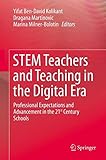STEM Teachers and Teaching in the Digital Era [electronic resource] : Professional Expectations and Advancement in the 21st Century Schools / edited by Yifat Ben-David Kolikant, Dragana Martinovic, Marina Milner-Bolotin.
Material type: TextPublisher: Cham : Springer International Publishing : Imprint: Springer, 2020Edition: 1st ed. 2020Description: XVI, 324 p. 62 illus., 50 illus. in color. online resourceContent type: text Media type: computer Carrier type: online resourceISBN: 9783030293963Subject(s): Teaching | Educational technology | Mathematics—Study and teaching | Science education | Technical education | Teaching and Teacher Education | Technology and Digital Education | Mathematics Education | Science Education | Engineering/Technology EducationAdditional physical formats: Printed edition:: No title; Printed edition:: No title; Printed edition:: No titleDDC classification: 370.711 LOC classification: LB1024.2-1050.75LB1705-2286Online resources: Click here to access online
TextPublisher: Cham : Springer International Publishing : Imprint: Springer, 2020Edition: 1st ed. 2020Description: XVI, 324 p. 62 illus., 50 illus. in color. online resourceContent type: text Media type: computer Carrier type: online resourceISBN: 9783030293963Subject(s): Teaching | Educational technology | Mathematics—Study and teaching | Science education | Technical education | Teaching and Teacher Education | Technology and Digital Education | Mathematics Education | Science Education | Engineering/Technology EducationAdditional physical formats: Printed edition:: No title; Printed edition:: No title; Printed edition:: No titleDDC classification: 370.711 LOC classification: LB1024.2-1050.75LB1705-2286Online resources: Click here to access online Preface; E. Faggiano -- Introduction: STEM Teachers and Traching in the Era of Change; Y. Ben-David Kolikant, D. Martinovic and M. Milner-Bolotin -- Part I: Expanding Teacher’s Roles: Empowerment -- Teacher Knowledge in the Era of Change; D. Martinovic and H. Horn-Olivito -- Mathematics Teachers Edit Textbooks: Opportunities and Challenges; R. Even -- Discussion: Teacher Learning in Community: Premises, Promises and Challenges; L. Orland-Barak -- Part II: Expanding Teacher’s Roles: Israeli and Canadian Perspectives; Professional Learning Communities of Science Teachers: Theoretical and Practical Perspectives; B-S Eylon, A. Scherz and E. Bagno; On Teaching and Learning Mathematics-Technologies; N. Sinclair; Part III: Developing Teacher Learning Communities in the Era of Change -- A Sense of Community in a Professional Learning Community of Chemistry Teachers: A Study of an Online Platform for Group Communication; R. Waldman and R. Blonder -- From Practice to Practical: Computer Science Teachers Teaching Teachers; O. Brandes, Y. Ben-David Kolikant and C. Beeri -- Motivators, Contributors, and Inhibitors to Physics Teacher-Leaders' Professional Development in a Program of Professional Learning Communities; S. Levy, E. Bagno, H. Berger and B-S. Eylon -- Discussion: Teacher Professional Development in the Era of Change; D. Martinovic and M. Milner-Bolotin.-Part IV: Emergent STEM Teaching Possibilities in the Era of Educational Technologies -- Deliberate Pedagogical Thinking with Technology in STEM Teacher Education; M. Miner-Bolotin -- Teaching Mathematics in the Digital Era: Standards and Beyond; M. Tabach and J. Trgalová -- Technology in mathematics teacher education: On trust and pitfalls; R. Zazkis -- Discussion: Emergent STEM teaching possibilities in an era of educational technologies; S. Kapon -- Part V: Teacher’s Knowledge for Successful 21st Century Teaching -- Issues of Teaching in new Technology-rich Environment: Investigating the case of New Brunswick (Canada) School Makerspaces; V. Freiman -- The Influence of Teacher's Orchestration using a novel system for Advancing group Learning on Students’ Conceptual Learning - the case of a Geometry Lesson; N. Prusak, O. Swidan and B. Schwarz -- Discussion: Creating a new world: Teachers’ work in Innovative Educational Environments; Y. Ben-David Kolikant.
This book brings together researchers from Israel and Canada to discuss the challenges today's teachers and teacher-educators face in their practice. There is a growing expectation that the 21st century STEM teachers re-examine their teaching philosophies and adjust their practices to reflect the increasing role of digital technologies. This expectation presents a significant challenge to teachers, who are often asked to implement novel technology-rich pedagogies they did not have a chance to experience as students or become comfortable with. To exacerbate this challenge, the 21st century teachers function not only in a frequently-changing educational reality manifested by continuous reforms, but are also bombarded by often contradictory and competing demands from the legislators, administrators, parents, and students. How do we break the vicious circle of reforms and support STEM teachers in making a real change in student learning? This book is unique for at least three reasons. First, it showcases research situated in Israel and Canada that examines the challenges today's teachers and teacher‐educators face in their practice. While the governments of both countries emphasize STEM education, their approaches are different and thus provide for interesting comparisons. Second, in addition to including research-based chapters, prominent scholars discuss the contributions in each of the book sections, problematizing the issues from a global perspective. Third, technology has a potential to empower teachers in this era of change, and this book provides the unique insights from each country, while allowing for comparisons, discussing solutions, and asking new questions. This book will be of interest to all involved in STEM teacher education programs or graduate programs in education, as well as to educational administrators interested in implementing technology in their schools.
